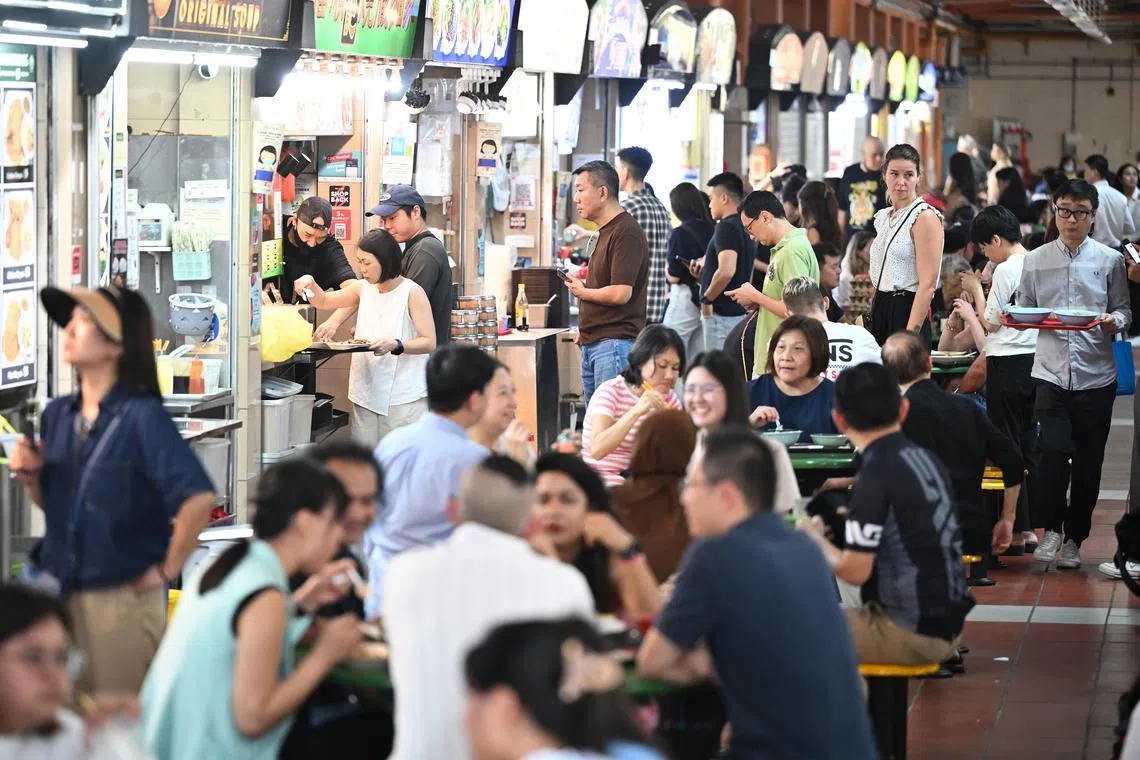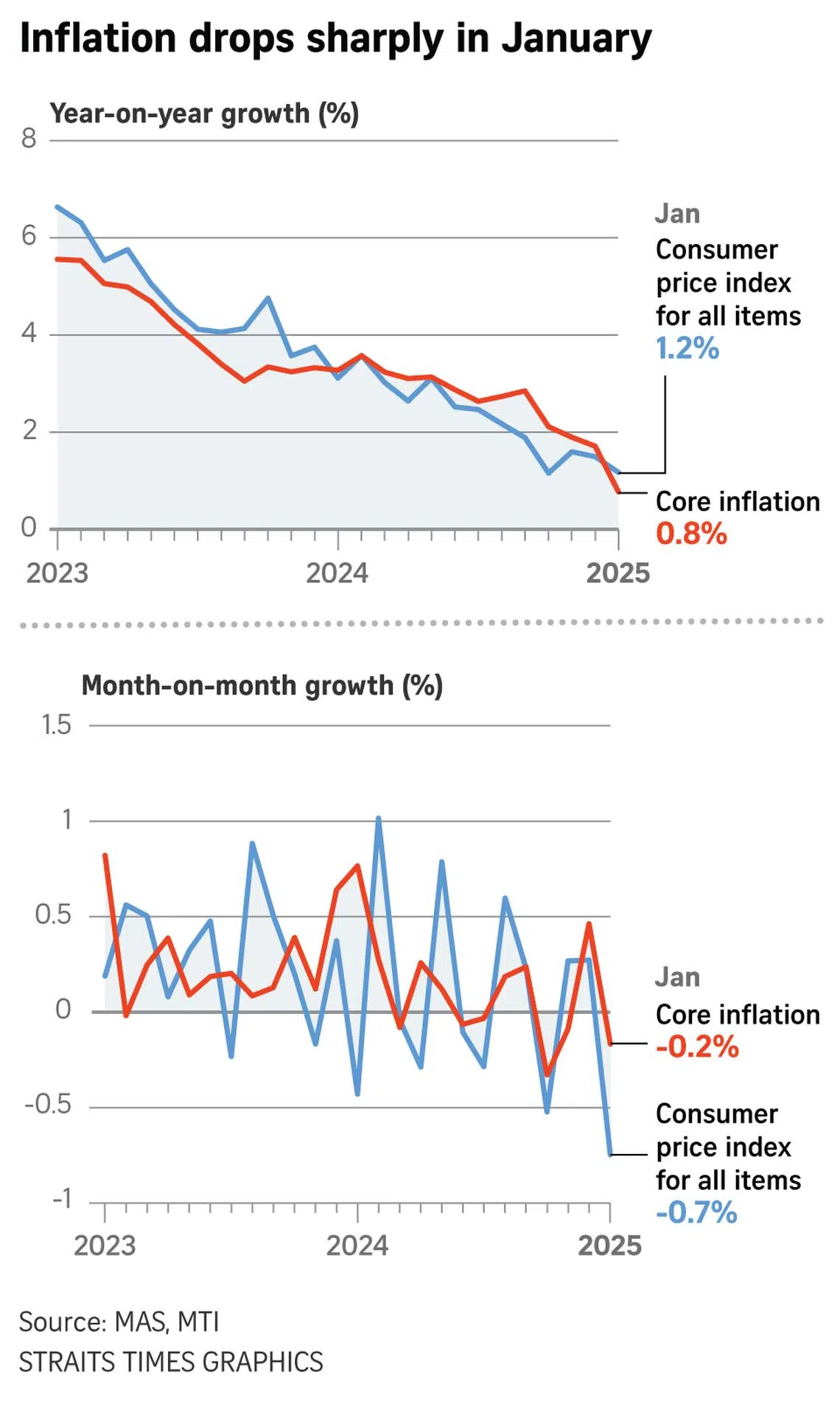S’pore core inflation falls sharply in January to 0.8% as price rises ease, CPI is rebased
Sign up now: Get ST's newsletters delivered to your inbox

Core inflation hit the lowest level since June 2021, when it was 0.6 per cent.
ST PHOTO: LIM YAOHUI
Follow topic:
SINGAPORE – Singapore’s core inflation extended its decline in January to a more than three-year low, on the back of a smaller increase in prices across broad categories, and after a rebasing of the consumer price index (CPI).
The sharp drop in core inflation beat economists’ expectations, with some saying prices will continue to be contained in the months ahead, although they warn about the effects of US tariffs.
Core inflation, which excludes private transport and accommodation costs to better reflect the expenses of households here, slid to 0.8 per cent year on year, from a revised 1.7 per cent in December
This is the lowest since June 2021, when core inflation was 0.6 per cent, and also beat a Bloomberg analysts’ forecast of 1.5 per cent. It is also much lower than the 3.1 per cent recorded in January 2024.
DBS Bank economist Chua Han Teng said the big 0.9 percentage point drop in core inflation – from December’s 1.7 per cent to January’s 0.8 per cent – is a magnitude not seen in years.
He attributed the sharp cooling to a broad-based moderation across major goods and services categories, as well as the fading effects of past goods and services tax (GST) hikes.
The Singapore Department of Statistics on Feb 24 said the CPI for general households has been rebased from a base year of 2019 to 2024. The replacing of an old base year with a more recent one is conducted once every five years to reflect the latest consumption patterns of Singapore households.
Overall – or headline – inflation eased further to 1.2 per cent year on year in January, down from a revised 1.5 per cent in December. This also beat economists’ consensus of 2.3 per cent.
On a month-on-month basis, which shows the momentum in prices, core inflation and overall inflation fell to minus 0.2 per cent and minus 0.7 per cent, respectively.
Singapore’s imported inflation is expected to remain moderate, reflecting favourable supply projections in key food commodity markets and forecasts of declines in global oil prices, the Monetary Authority of Singapore (MAS) and Ministry of Trade and Industry said in their joint report on Feb 24.
They left their 2025 inflation forecasts unchanged.
This is after MAS on Jan 24 cut its projection for core inflation to 1 per cent to 2 per cent, from 1.5 per cent to 2.5 per cent.
It kept its forecast for overall inflation forecast unchanged at 1.5 per cent to 2.5 per cent on an anticipated pickup in private transport inflation.
Maybank economist Chua Hak Bin said the sharp month-on-month fall in core inflation was a surprise, and that the decline was not because January 2024 had a higher inflation base. The base then was higher due to the GST hike.
He said the sharp drop was led by a steep fall in prices in three segments – electricity and gas, accommodation and services.
Dr Chua added that “the sharp fall in inflation reaffirms our view that MAS will likely ease monetary policy again, probably at the April meeting”, and that core inflation “will likely remain benign for the rest of the year”.
For instance, he said the recent Budget handouts of utility and conservancy rebates in April and July will further dampen housing and utilities inflation.

Looking at the 2024-based and 2019-based CPI weighting patterns, OCBC Bank chief economist Selena Ling said the latest rebasing is unlikely to have contributed to the softer January 2025 inflation readings.
She also said that while trade frictions may escalate and prove inflationary for economies like the US, the impact on Singapore’s imported prices is likely to be mitigated due to weaker global demand.
Ms Ling added that Budget 2025-related enhanced government subsidies for essential services, namely public healthcare, pre-school education and public transport, should also dampen services inflation.
In January, prices fell for two categories of items – electricity and gas, and retail and other goods.
Electricity and gas prices fell 2.9 per cent year on year, after rising 2.4 per cent in December.
The cost of retail and other goods shrank 0.6 per cent in January, after a rise of 0.5 per cent in December. This drop was led by a sharper decline in the prices of footwear, alongside a fall in the prices of medical goods and other personal effects.
Inflation eased for all other categories – except for private transport costs, which rose 2.8 per cent due to higher car prices. This reversed a 0.9 per cent decline in December.
Food inflation moderated to 1.5 per cent in January from 2.3 per cent the previous month, as the prices of prepared meals rose at a slower pace.
Services inflation dipped to 1 per cent in January from 1.6 per cent in December. This was largely due to a fall in the costs of general, vocational and higher education, as well as outpatient and inpatient care services.
Accommodation inflation eased to 1.6 per cent in January from 2.1 per cent in December. This was on account of smaller increases in both housing rents and housing maintenance and repair costs.
Claire Huang is a senior business correspondent at The Straits Times, writing about inflation, insurance and new finance like digital assets and payments.


